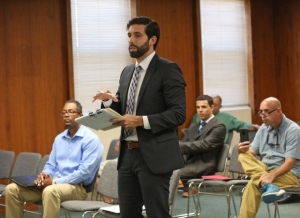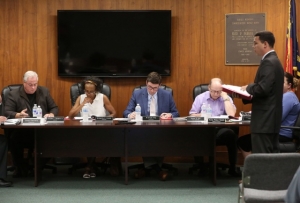Board declines to pursue councilman residency
By Joey Pitchford
Published in News on July 11, 2018 5:50 AM

News-Argus/CASEY MOZINGO
Jeff Loperfido, attorney with the Southern Coalition for Social Justice, represents Goldsboro Councilman Antonio Williams, seated at left, during the preliminary voter challenge at the Wayne County Board of Elections Tuesday. Williams' residency was challenged by Zachary Lilly, seated right of center.

News-Argus/CASEY MOZINGO
The Wayne County Board of Elections reads documentation provided by Zachary Lilly during a preliminary voter challenge Tuesday.
The saga of Goldsboro City Councilman Antonio Williams' residency may have come to an end Tuesday afternoon, as the Wayne County Board of Elections unanimously decided not to pursue a formal hearing to determine if Williams resides in his voter precinct.
The decision came during a preliminary hearing on the June 7 voter challenge filed against Williams by Goldsboro resident Zachary Lilly, a meeting attended by fellow Councilman Bevan Foster, County Commissioner Ed Cromartie and Wayne County Democratic Party Chairman Barbara D'Antonio.
After hearing arguments from both Lilly and Jeff Loperfido, Williams' attorney with the Southern Coalition for Social Justice, the board collectively agreed that there was little to no evidence that Williams does not currently live in his precinct.
Lilly did not actually attempt to prove that Williams does not live at his registered address of 143 N. Center St. Rather, he pointed to a period of time in which Williams admitted to not living at 304 Wilmington Ave., his registered address at the time.
Williams confirmed that he moved from the address in 2016, but declined at the time to say where he had moved to, citing safety concerns for the elderly relatives he claimed to be staying with.
Lilly said that this gap was what concerned him and that Williams had violated the law by not providing his actual place of residence to the board.
"The biggest issue that I have is the gap," Lilly said. "It would be like the president of the United States renouncing his citizenship halfway through his term of office, and then coming back in the same term, getting his citizenship back and saying 'I'm still president.'
"Once you leave the district, you resign your position."
Lilly did not have definitive proof that Williams did in fact leave the district at any point and said that there was no way for him to obtain that proof short of hiring a private investigator.
Jimmy Hull, a member of the Wayne County Board of Elections, said that as long as Williams lived in his district, it did not matter where in the district he stayed. Given the lack of proof that Williams ever left District 1, Hull was skeptical of Lilly's challenge.
"He represents District 1," Hull said. "He was elected in District 1, and the way I read this at no time did he live outside District 1.
"I don't care if he lives in tent or a vacant lot."
Loperfido, speaking for Williams, said the lack of affirmative proof alone was enough to dismiss the case, as the burden of proof in a voter residency challenges is on the challenger, not the challenged. The question before the board was whether or not Williams currently lives in his registered precinct, not whether or not he ever resided outside it at some point, he said.
"Because Mr. Williams is registered at 143 N. Center St., the obligation for Mr. Lilly is to present affirmative proof that he has abandoned his precinct, not that he once lived in a different precinct, but that he abandoned his present registered precinct with no intention to return," Loperfido said.
Despite not being required to provide any evidence, Loperfido produced several documents -- including a pay stub, utility bill and photos of Williams' Center Street apartment -- intended to prove that Williams does in fact live where he says he does.
Soon after, the four-member Board of Elections took a quick, unanimous vote to end the process there rather than move on to a full hearing, citing a lack of sufficient evidence. From start to finish, the hearing took less than an hour.
Williams was mostly silent during the hearing, except when he provided his name and address to the board. He received a residential occupancy permit for a portion of his 143 N. Center St. property, in June, in downtown Goldsboro.
